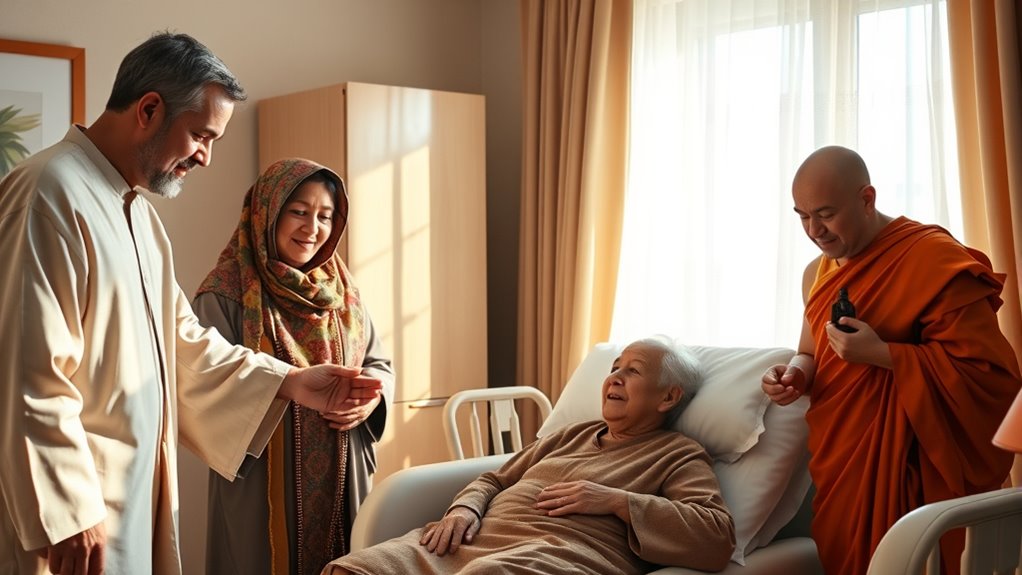Providing spiritual care at end of life means respecting each individual’s diverse faiths and beliefs. It involves genuine communication, active listening, and honoring rituals, symbols, and preferences specific to their tradition. Collaborating with spiritual leaders can enhance understanding and support personalization. Creating a safe, ethical environment encourages open expression of faith. Continuing further will help you learn more about how to deliver compassionate, inclusive spiritual care that truly honors each person’s spiritual journey.
Key Takeaways
- Recognize and honor individual beliefs, practices, and rituals to provide personalized spiritual care.
- Use culturally sensitive communication and active listening to understand diverse faith perspectives.
- Collaborate with spiritual and religious leaders to align care with patients’ spiritual needs.
- Respect patient autonomy and ensure informed consent when incorporating spiritual interventions.
- Create a safe, private environment that encourages open expression of faith and spiritual feelings.
Understanding the Importance of Spiritual Care at End of Life
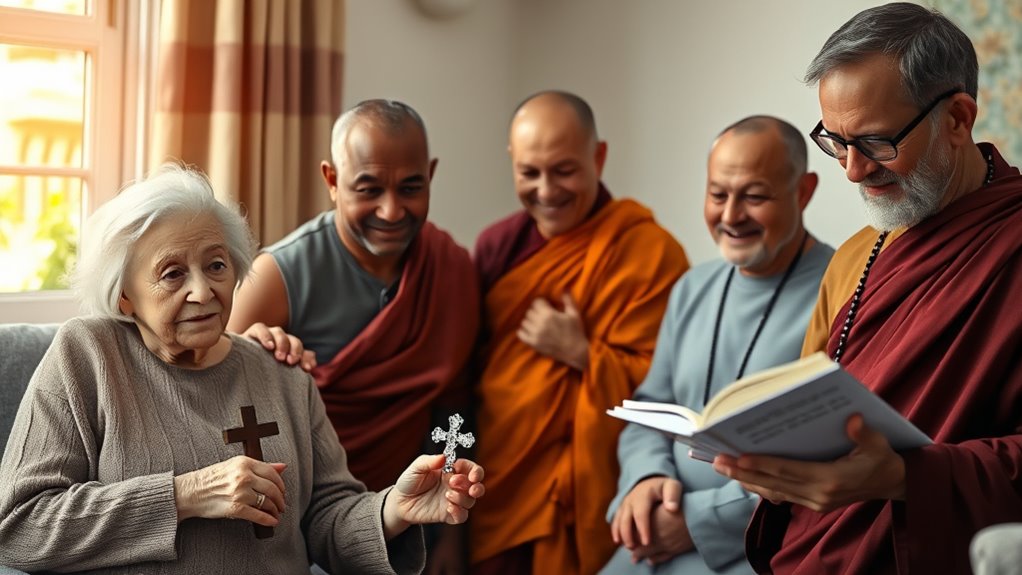
Understanding the importance of spiritual care at end of life is crucial because it addresses the emotional and existential needs that often surface during this difficult time. When facing the end of life, you may feel overwhelmed, uncertain, or afraid. Spiritual care helps you find meaning, peace, and comfort amidst these challenging emotions. It provides a space to reflect on your life, connect with your beliefs, and seek reassurance. This support can ease feelings of loneliness and despair, fostering a sense of hope and acceptance. Recognizing that spiritual needs are deeply personal, addressing them holistically can profoundly improve your quality of life in your final days. Additionally, understanding diverse faiths and cultural backgrounds enables caregivers to offer more respectful and personalized spiritual support. Being aware of different faith traditions helps caregivers tailor their approach to respect individual beliefs and practices. By attending to these needs, caregivers help you navigate this stage with dignity, compassion, and a sense of spiritual fulfillment.
Recognizing the Diversity of Faiths and Spiritual Beliefs
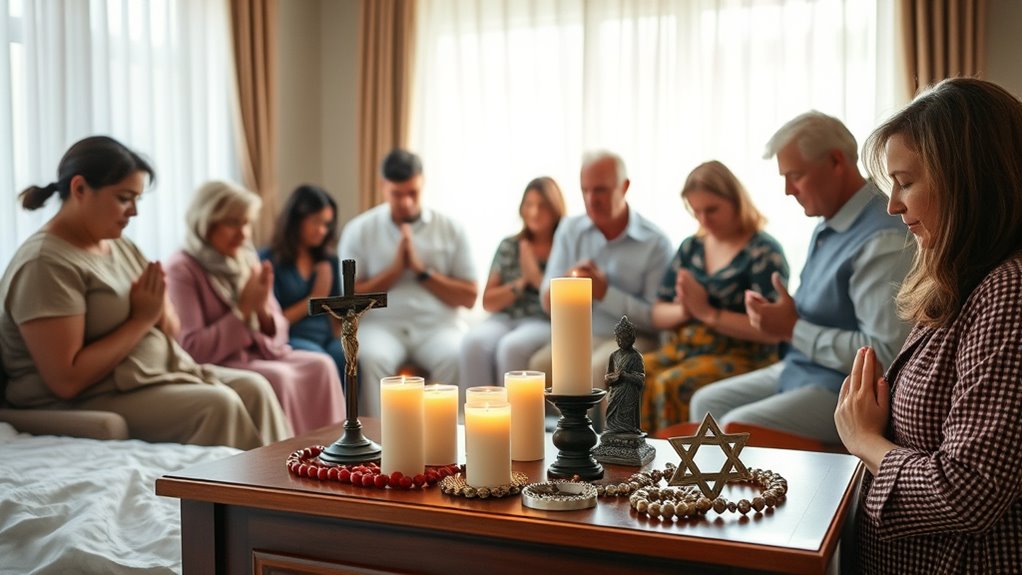
Recognizing the diversity of faiths and spiritual beliefs is essential because it guarantees that end-of-life care respects each person’s unique worldview. Different cultures and religions have specific practices, rituals, and symbols that hold deep significance. By understanding this diversity, you ensure that care plans are tailored to honor individual beliefs, fostering comfort and dignity. Take time to learn about various faith traditions and avoid assumptions. Respect personal expressions of spirituality, whether they align with organized religion or personal philosophies. Remember, what’s meaningful to one person might not be to another. Being aware of spiritual care practices can help healthcare providers deliver more compassionate support tailored to each individual. Your openness to diverse beliefs helps create an environment where patients feel valued, understood, and supported during their final moments. Recognizing these differences is vital for providing truly compassionate and respectful care.
Communicating Respectfully About Spiritual Needs

When discussing spiritual needs with patients, it’s important to approach the conversation with genuine respect and sensitivity. Use open-ended questions to encourage patients to share their beliefs and feelings without judgment. Listen actively, maintaining eye contact and providing your full attention. Avoid assumptions about their faith or preferences, and instead, ask clarifying questions to understand their unique perspective. Be mindful of your tone and body language, ensuring they convey compassion and respect. If you don’t know something, admit it honestly and be willing to seek guidance or support. Remember, your goal is to create a safe space where patients feel comfortable expressing their spiritual needs without fear of dismissal or misunderstanding. Incorporating respectful communication techniques can further foster trust and openness in these sensitive conversations. Practicing cultural humility can help you better honor the diverse backgrounds and beliefs of your patients.
Incorporating Cultural Sensitivity Into Care Practices

You need to respect each patient’s cultural beliefs and practices, recognizing their importance in end-of-life care. Communicate with sensitivity to avoid misunderstandings and show genuine respect for their traditions. Thoughtfully incorporate rituals to honor their values while providing compassionate, personalized care. Building cultural competence can further enhance understanding and support during this sensitive time. Embracing attention in practice can help caregivers remain fully present and responsive to the unique needs of each patient and family.
Respect Cultural Beliefs
Respecting cultural beliefs is essential to providing holistic end-of-life care that honors each person’s identity and values. You should take the time to understand the patient’s cultural background and how it influences their views on death, dying, and spiritual practices. Be open-minded and avoid assumptions, asking respectful questions when necessary. Incorporate traditional rituals or practices if they are meaningful to the patient, and coordinate with family members to ensure cultural needs are met. Recognize that beliefs about pain, suffering, and the afterlife vary widely, and honor these perspectives. By respecting these cultural nuances, you create a supportive environment that affirms the patient’s dignity and sense of identity during their final moments.
Communicate With Sensitivity
Effective communication with sensitivity requires being aware of and attuned to a patient’s cultural background, as it shapes how they interpret and respond to end-of-life discussions. You should listen carefully and observe non-verbal cues, understanding that some patients may need more time to process information or prefer indirect communication. Use respectful language and avoid assumptions about their beliefs or preferences. Ask open-ended questions to clarify their values and wishes, showing genuine interest and compassion. Be mindful of cultural taboos or language barriers that could influence their comfort level. Your goal is to create a trusting environment where patients feel safe sharing their concerns. By approaching conversations with cultural humility, you foster meaningful connection and support their dignity at the end of life.
Incorporate Rituals Thoughtfully
Building on sensitive communication, incorporating rituals thoughtfully honors each patient’s cultural and spiritual identity at the end of life. You should learn about the specific rituals that are meaningful to your patient, respecting their traditions and preferences. Ask open-ended questions to understand how they wish to observe their faith or cultural practices. Whenever possible, facilitate these rituals, whether that means enabling specific prayers, rites, or ceremonies. Be mindful of timing, space, and privacy, ensuring the patient feels comfortable and respected. If you can’t directly provide a ritual, help connect the patient with spiritual or cultural leaders. Thoughtful incorporation of rituals affirms their beliefs and offers comfort during a vulnerable time. Your respectful approach can appreciably ease their spiritual suffering and foster dignity.
Collaborating With Spiritual and Religious Leaders
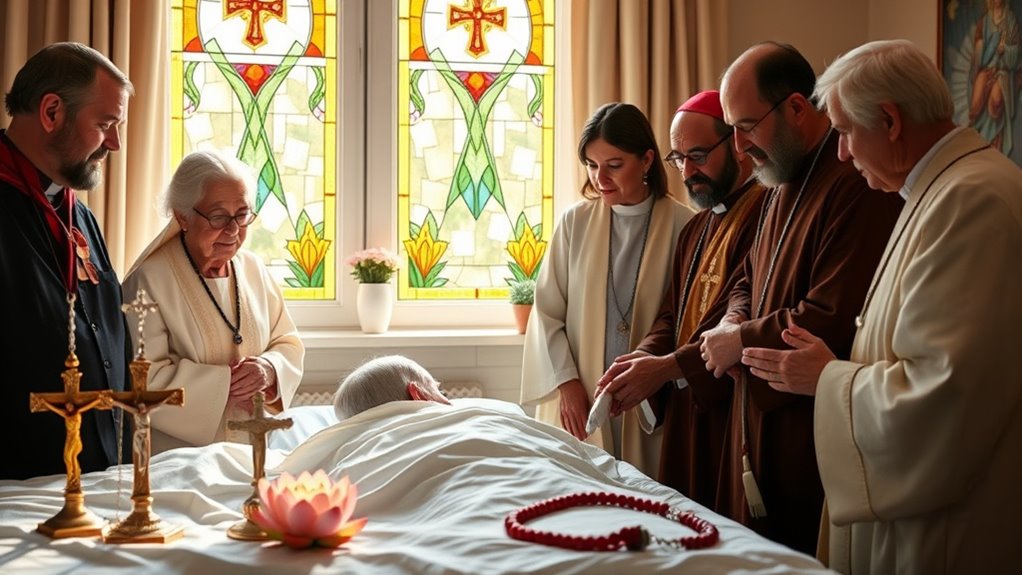
Building trust with spiritual and religious leaders is essential for providing holistic end-of-life care. You should respect their diverse beliefs and work collaboratively to honor the patient’s values. By doing so, you guarantee that care is compassionate and aligned with each individual’s spiritual needs. Incorporating diverse faiths into planning ensures inclusivity and respect for all spiritual perspectives.
Building Trust With Leaders
Establishing trust with spiritual and religious leaders is essential for providing holistic end-of-life care. To build that trust, be transparent about your goals and respectful of their expertise. Show genuine interest in their perspectives and listen actively. Consistently follow through on commitments to demonstrate reliability. Recognize their influence within the community, which can foster collaboration and mutual respect.
Remember these key points:
- Respect their spiritual authority and experience
- Communicate openly and honestly
- Value their insights into cultural and faith practices
- Be patient and allow relationships to develop naturally
Respecting Diverse Beliefs
Respecting diverse beliefs is fundamental to effective collaboration with spiritual and religious leaders, especially at the end of life. You must approach each situation with openness and humility, recognizing that different faiths have unique perspectives on dying and spiritual care. Listen actively to understand the specific needs and preferences of patients and their families, without imposing your own beliefs. Build rapport by showing respect for their traditions, rituals, and values. When working with leaders, acknowledge their expertise and seek their guidance to provide culturally sensitive support. Always communicate with sensitivity, avoiding assumptions or judgments. By honoring diverse beliefs, you foster trust, ensuring that spiritual care enriches the patient’s final moments and respects their spiritual identity.
Addressing Common Spiritual Concerns and Questions

Many patients nearing the end of life have pressing spiritual concerns and questions that can deeply affect their peace and sense of meaning. You can help by listening carefully and offering honest, compassionate responses. Common questions may include doubts about the afterlife, feelings of guilt or regret, concerns about divine judgment, or fears of leaving loved ones behind. To address these, consider:
- Encouraging open dialogue about fears and beliefs
- Providing reassurance tailored to their faith or spiritual perspective
- Offering comfort through prayer, scripture, or rituals if appropriate
- Validating their feelings without judgment
- Recognizing the importance of spiritual principles in guiding compassionate care and supporting patients’ spiritual well-being. Incorporating professional camper conversion services can also facilitate a comforting environment tailored to individual needs.
- Recognizing the importance of cybersecurity in protecting sensitive health information to ensure patient confidentiality and trust. Additionally, understanding vetted products for safety and efficacy can help address concerns about spiritual or physical well-being during end-of-life care. Being aware of medical device safety standards can further ensure that any equipment used aligns with best practices for patient safety.
Creating a Supportive Environment for Spiritual Expression
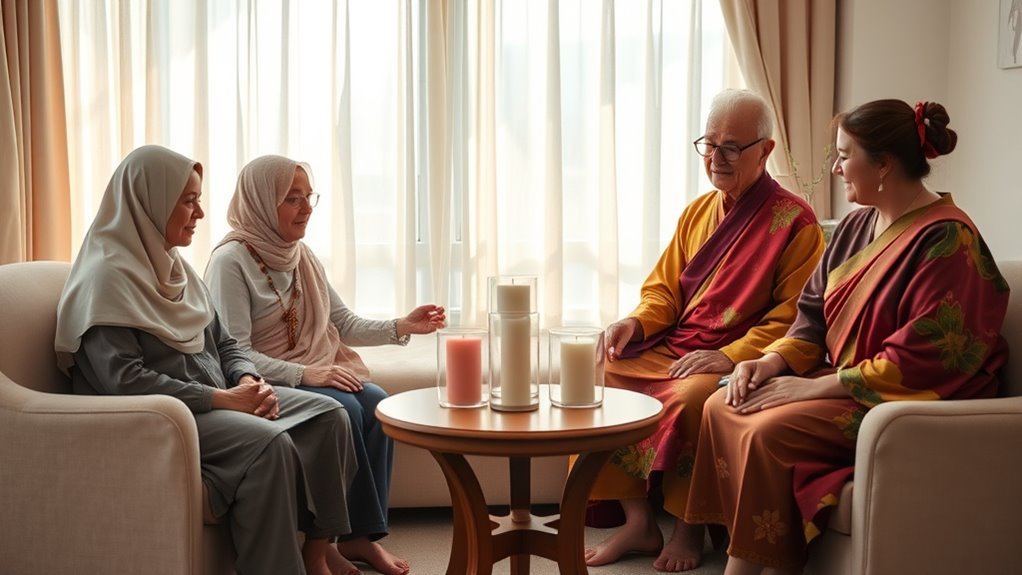
Creating a supportive environment for spiritual expression involves actively fostering a space where patients feel safe to share their beliefs, doubts, and feelings without fear of judgment. You can achieve this by listening attentively, showing genuine respect, and avoiding interruptions or dismissive comments. Guarantee privacy and minimize distractions to help patients feel comfortable opening up. Use open-ended questions to invite sharing and validate their experiences, even if they differ from your own beliefs. Display cultural sensitivity by being aware of diverse practices and preferences. Simple gestures, like offering a quiet space or providing spiritual symbols, can make a significant difference. Remember, your openness and respect create a foundation where patients feel empowered to express their spirituality authentically.
Ethical Considerations in Respecting Spiritual Preferences
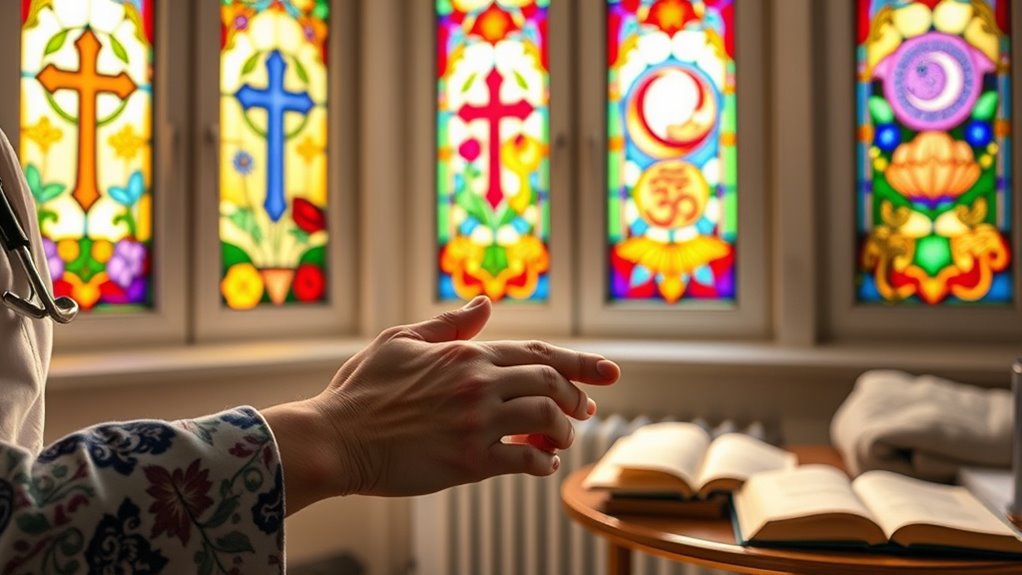
Ensuring that spiritual preferences are honored at the end of life involves steering complex ethical considerations. You must balance respecting individual wishes with professional and institutional boundaries. Respect for autonomy is central, but you also need to regard potential conflicts with medical guidelines or institutional policies.
Honoring spiritual wishes at end of life requires balancing autonomy with ethical and institutional boundaries.
Remember:
- Respect patient autonomy while ensuring safety and ethical standards.
- Recognize that informed consent is essential for spiritual interventions.
- Be aware of potential conflicts between spiritual wishes and medical treatments.
- Maintain confidentiality and privacy when discussing spiritual preferences.
Navigating these considerations requires sensitivity and clear communication. Your goal is to honor diverse spiritual needs without compromising ethical principles or patient safety. Striking this balance ensures respectful, compassionate end-of-life care.
Training and Resources for Providing Inclusive Spiritual Care

Have you considered how all-encompassing training and accessible resources can enhance your ability to provide inclusive spiritual care? Effective training prepares you to recognize diverse spiritual needs and respect different faith expressions. Look for programs that cover cultural competence, religious literacy, and communication skills. Resources like spiritual assessment tools, multilingual materials, and partnership with chaplains or faith leaders can deepen your understanding and support. Incorporating mindfulness practices into your training can improve your ability to connect with patients on a deeper level. Ongoing education helps you stay current with evolving spiritual practices and sensitivities. By investing in exhaustive training and utilizing available resources, you ensure that all patients feel seen, respected, and supported at the end of life. This proactive approach fosters trust, dignity, and personalized care that honors each individual’s spiritual journey.
Frequently Asked Questions
How Can Healthcare Providers Navigate Conflicting Spiritual Preferences Among Family Members?
When family members have conflicting spiritual preferences, you can navigate this by actively listening to each person’s perspective and validating their feelings. You should communicate openly, seeking common ground or compromises that honor the patient’s wishes. It is crucial to involve the patient in decisions when possible and consult with spiritual care professionals to facilitate respectful dialogue. Prioritizing the patient’s values ensures compassionate and respectful care despite differing family beliefs.
What Strategies Exist for Addressing Spiritual Distress in Patients With No Religious Affiliation?
You can address spiritual distress in patients without religious ties by exploring their personal values and sources of meaning. Engage in open, empathetic conversations to understand what gives their life purpose, whether it’s relationships, nature, or personal achievements. Offer supportive practices like mindfulness or guided imagery, and involve mental health professionals if needed. Respect their individuality, and tailor your approach to help them find peace and comfort during this challenging time.
How Do Healthcare Teams Handle Requests for Specific Religious Rites They Are Unfamiliar With?
Imagine you’re steering a vast, unfamiliar forest, each trail representing a different faith. When a patient requests a rite you’re unfamiliar with, you become the guide, seeking out maps or local guides—experts or resources—to understand the path. You collaborate with chaplains, community leaders, or research to honor their spiritual needs respectfully. Your openness and willingness to learn assure you respect their journey, even through uncharted territory.
What Legal Considerations Are Involved in Honoring Spiritual Practices at End of Life?
When you consider honoring spiritual practices at end of life, you must be aware of legal considerations like respecting patient rights under laws such as the Patient Self-Determination Act. You’re responsible for ensuring informed consent and avoiding discrimination based on religion. Document all requests carefully, and collaborate with chaplains or legal advisors if needed. By doing so, you protect both the patient’s wishes and your facility from potential legal issues.
How Can Technology Facilitate Spiritual Support for Patients With Limited Mobility or in Remote Locations?
Sure, because nothing beats a good old-fashioned face-to-face chat, right? But when mobility’s limited or you’re miles away, technology steps in as your spiritual courier. Video calls, virtual prayer groups, and apps connect you with spiritual leaders, offering comfort and support. You get to share your faith, ask questions, and find solace—all without leaving your cozy, tech-enabled space. Who knew screens could be so soul-nourishing?
Conclusion
By embracing diverse spiritual beliefs, you can truly honor each person’s end-of-life journey. Research suggests that spiritual care improves comfort and peace, supporting the idea that honoring faith is essential for holistic well-being. When you communicate with respect and cultural sensitivity, you create a compassionate environment where everyone feels valued. Your efforts make a meaningful difference, helping individuals find serenity and dignity in their final moments.
